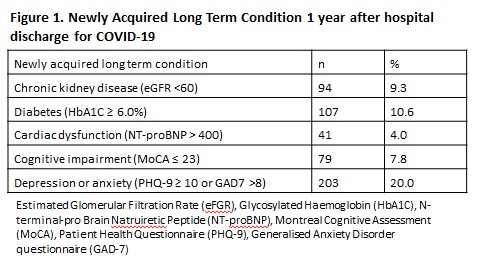Abstract
Introduction
The prevalence, type and impact of newly acquired long term conditions (NA-LTC) after COVID-19 are largely unknown.
Methods
Adult survivors of a hospital admission in the UK were prospectively recruited to the Post-HOSPital COVID-19 (PHOSP-COVID) study and data from an in-person research visit at 1 year were used for this analysis. NA-LTCs were defined by objective clinical blood tests for chronic kidney disease, heart failure and diabetes, the Montreal Cognition Assessment for cognitive impairment, questionnaires for mental health, and with no known pre-existing disease. Health-Related Quality of Life (HRQoL) was assessed by the EQ5D-5L.
Results
Of 1,013 participants (62% male, 19% received invasive mechanical ventilation) with complete datasets, 416 (41%) had a NA-LTC C at one year. [Figure 1] shows the type and prevalence of NA-LTC. Those reporting a NA-LTC had a mean (95%CI) EQ5D-5L utility index score 36% (25%-46%) lower than those without a NA-LTC after adjusting for case-mix differences.

Conclusion
With 4 in 10 participants having a NA-LTC at 1 year post discharge, our data highlight the need for pro-active healthcare after a hospital admission to diagnose and manage new LTCs to improve HRQoL. Further investigation is needed to differentiate between pre-existing but undiagnosed conditions versus a direct consequence of COVID-19.